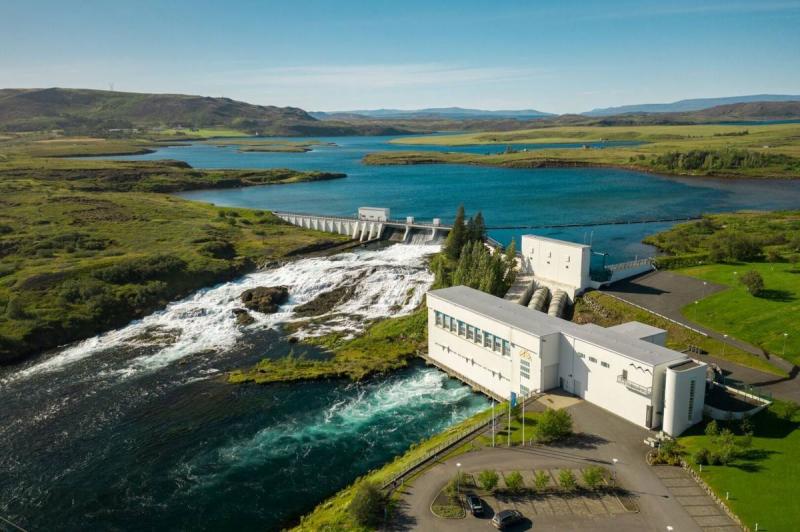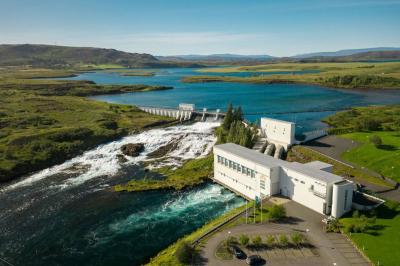Under the title "The Green Bitcoin Mining Energy is on the Verge of Exhaustion," Bloomberg's Eastern website reported that the Nordic region has begun to lose its competitive edge in green Bitcoin mining amid increasing scrutiny of carbon emissions from the industry and a growing number of investors ranging from Elon Musk to small investors. Iceland, Sweden, and Norway are popular locations for cryptocurrency mining due to their abundant geothermal, hydropower, and wind energy. In contrast, China, which mines most cryptocurrencies, primarily relies on coal power. The energy surplus in the Nordic countries is expected to diminish due to the demands of aluminum smelters, oil platforms, and steel producers for renewable energy.
Hordur Arnarson, CEO of Landsvirkjun, the Icelandic national energy company, stated, "There may be very little energy surplus during 2021 and 2022. Given the climate issues, we are witnessing rapid growth in many interesting sectors, many of which need electricity." Cryptocurrency mining relies on computers that solve complex algorithms in spaces the size of airport hangars, making electricity a key input for an industry consuming the same amount of energy as thousands of homes, a figure that continues to rise.
Citigroup stated in a recent report that Bitcoin mining now consumes 66 times more electricity than in 2015, and the carbon emissions from this process may face increasing regulation. According to a study published in the journal Nature Communications, emissions from cryptocurrency mining in China are expected to peak in 2024, releasing as much carbon dioxide into the atmosphere as the entire country of Italy.
Iceland is a pioneer in green mining. According to the Icelandic Blockchain Foundation, Iceland hosted up to 8% of global Bitcoin production four years ago, a number that has now dropped to less than 2%. Cambridge University estimated Iceland's contribution at less than that, at 0.35% of global production in April 2020, which is the latest available data. In contrast, China accounted for 65% of global production at that time. The growing concern about cryptocurrency's influence in China has spurred demand for mining sites elsewhere. Kevin O'Leary, head of O'Leary Funds, told CNBC earlier this month that two types of Bitcoin will emerge: "polluted currency" mined in China and "clean currency" mined using sustainable hydropower, suggesting that proof of origin will be possible and preferring the environmentally friendly type.
Gigantic smelters built decades ago to take advantage of cheap energy are the largest consumers of electricity in Iceland. According to Landsvirkjun, with rising aluminum prices, facilities owned by Rio Tinto and others will consume more electricity after slowing down in 2020.
It is unclear exactly how many people are working in cryptocurrency mining in the region, as Canadian firm Hive Blockchain Technologies has expanded home mining, with Iceland and Sweden following suit this year. Genesis Mining, listed in Hong Kong, operates facilities in Sweden and Iceland, in addition to Bitfury Holding's activity on the volcanic island. None of the mentioned companies responded to inquiries regarding the region's role in the future of green mining.
Gizli K. R. Katrinason, chief operating officer of Iceland's largest data center operator, which hosts some miners, stated he does not expect an energy shortage.
Daniel Fenar Jonsson, CEO of the new mining company Green Blocks, feels optimistic after Bitcoin's price surpassed $60,000 for the first time this month. Jonsson referred to Iceland's notable history in the industry and mentioned that carbon-free energy remains an advantage for the country.
In other parts of the Nordic region, energy-intensive green industries will produce everything from carbon-free steel to hydrogen and ammonia. The attractiveness of these investments lies in their contribution to the economy by creating thousands of jobs while also helping to reduce emissions, while mining, on the other hand, offers little support to the community.
Espen Barth Eide, a chief legislator on energy issues at the Norwegian Labour Party, stated that Bitcoin mining poses a problem as "it leads to an almost infinite increase in demand for energy and will replace other industries that are much more productive." According to the head of Statnett, Norway's electricity program will increase energy demand by 30% by 2040. The Nordic country, referred to as "Europe's green battery" due to its vast water resources, is preparing to supply more electricity to the continent via new cables, limiting electricity availability for new large users.
According to industry consultant Volue Insights, the energy surplus in the Nordic countries, excluding Iceland, is expected to shrink by 90% from 2023 until the end of the decade, with new demand primarily for hydrogen production and data centers.
Aernarson, head of the Icelandic energy facility, stated that although Iceland built a separate hydropower station to allow for a new smelter in 2008, this special treatment will not extend to Bitcoin miners.
He said, "No one will build a power plant for Bitcoin mining, as much uncertainty surrounds its future development." Cryptocurrencies emerged as an alternative investment in the past decade but have gained notoriety for causing significant losses for investors. A massive crash three years ago led the cryptocurrency market into a freeze. While billionaires like Warren Buffett rejected them, they gained wide popularity among rebellious businessmen like Musk. However, they have rebounded again after doubling in value this year.
On the other hand, Goldman Sachs and Morgan Stanley are planning to offer cryptocurrency investments to their clients. Tesla revealed earlier this year a $1.5 billion investment in Bitcoin, accepting it as payment for its electric cars.
Returning to Iceland, Johan Snorri Sigurbjorgsson, business development manager at HS Orka Energy Station, which is working to increase energy production in the Reykjanes Peninsula in southwestern Iceland, stated that the country is closer to experiencing an energy shortage than an abundance.
While Sigurbjorgsson is open to accepting more clients eventually, the current price must be "very high." He concluded, "We will need to purchase some energy from the market to be able to serve them. But this type of business does not include the price that miners are seeking."




